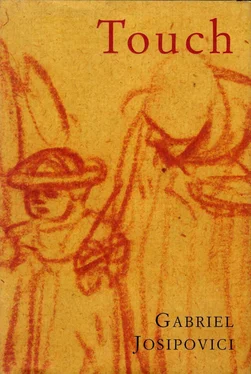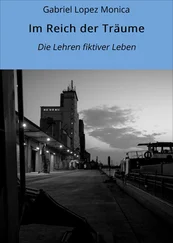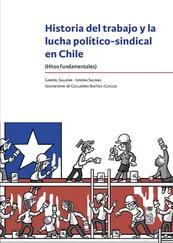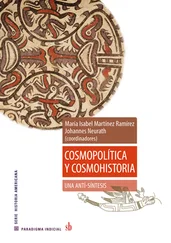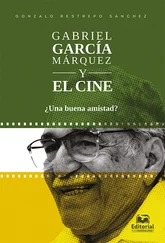Gabriel Josipovici - Touch
Здесь есть возможность читать онлайн «Gabriel Josipovici - Touch» весь текст электронной книги совершенно бесплатно (целиком полную версию без сокращений). В некоторых случаях можно слушать аудио, скачать через торрент в формате fb2 и присутствует краткое содержание. Год выпуска: 1996, ISBN: 1996, Издательство: Yale University Press, Жанр: Современная проза, на английском языке. Описание произведения, (предисловие) а так же отзывы посетителей доступны на портале библиотеки ЛибКат.
- Название:Touch
- Автор:
- Издательство:Yale University Press
- Жанр:
- Год:1996
- ISBN:0300066902
- Рейтинг книги:5 / 5. Голосов: 1
-
Избранное:Добавить в избранное
- Отзывы:
-
Ваша оценка:
- 100
- 1
- 2
- 3
- 4
- 5
Touch: краткое содержание, описание и аннотация
Предлагаем к чтению аннотацию, описание, краткое содержание или предисловие (зависит от того, что написал сам автор книги «Touch»). Если вы не нашли необходимую информацию о книге — напишите в комментариях, мы постараемся отыскать её.
Touch — читать онлайн бесплатно полную книгу (весь текст) целиком
Ниже представлен текст книги, разбитый по страницам. Система сохранения места последней прочитанной страницы, позволяет с удобством читать онлайн бесплатно книгу «Touch», без необходимости каждый раз заново искать на чём Вы остановились. Поставьте закладку, и сможете в любой момент перейти на страницу, на которой закончили чтение.
Интервал:
Закладка:
The beauty and pain of both playing and watching tennis, though, has a great deal to do with the scoring system, which makes it very difficult for anyone to keep this up for a whole match. Hoad managed it when he demolished Ashley Cooper in the 1957 Wimbledon final (the first game of tennis I ever saw on television), and Connors managed it when he thrashed Rosewall in the 1973 final. But most of the time no one can take complete control, as one would in a race or a football match. There is too much time between points and between games. However hard you try you cannot keep yourself from thinking, from wondering if your touch is going to desert you or your opponent is finally going to find his. So many dreams turn into nightmares, tests not so much of skill and stamina, as in other sports, but of your whole balance and co-ordination. You start to become conscious of your touch and that is probably the moment when it begins to desert you. Whether you have begun to grow aware of it because it has already started to go or whether it starts to go precisely because you become aware of it no one can tell. But it is a curious and well-known fact about tennis that to win the first set 6–0 may not be the best way of ensuring an eventual victory. I suspect more matches are won from 0–6 down than from 3 or 4–6.
Tennis is a game where real time plays a key role. In football one may rue a missed opportunity but there is little time to think about it. In tennis the half-chance not taken, the break-point muffed, goes on haunting one and can easily lead to that dread tightening of the arm, that sense of unease which no amount of will or exertion can dissipate. That was Borg's great strength, apart from his extraordinary balance and speed of foot: a point played seemed to be over and forgotten as soon as it was done, leaving him totally free to concentrate absolutely on the next one.
A game which had looked comfortably won one moment can seem irretrievable only ten minutes later, and one wonders miserably, between points, what on earth one can do to get back the touch which was so effortlessly there just minutes before. So Adam must have wondered about the eating of the apple as he sweated away miserably, trying to scratch a living from the soil, and so Marcel must have felt on waking up to recall how, the evening before, he had managed to inveigle his mother into spending much of the night reading to him from his favourite book.
A few years ago I took up Aikido. I had twisted my knee playing six-aside football long after I should have given up the game, and it wouldn't stop hurting. Every time I tried to play tennis the injury flared up again. The doctors prodded and X-rayed but couldn't find anything wrong. Finally a specialist suggested that the only solution would be to go in to hospital for an exploratory probe. The idea did not appeal to me, and when I mentioned it to a former pupil who had spent a year in Japan and, I knew, practised some sort of Japanese martial art, he said Aikido would be just the thing for the knee. A lot of it was actually done on the knees, he said, and I would thus gradually build up the muscles in that region. I had never much liked the idea of bowing to portraits of the Master and throwing opponents over my shoulder (or, for that matter, being thrown over someone else's shoulder), but he merely smiled when I said all this and suggested I come along to the Dojo one day and have a look. So as not to appear churlish I went, and was pleasantly surprised. Although classed as a martial art, Aikido is non-aggressive. You work with a partner, not an opponent, and, though there was quite a lot of bowing, there seemed to be much less throwing over the shoulders than I had imagined. I decided to give it a try.
What I learned from my few years of Aikido has helped me to understand many things, for what it teaches applies to most activities, both physical and mental. The one key lesson is that the ideal state is one where you are both utterly relaxed and utterly concentrated. This is a notion which is alien to most of us in the West, who tend to think of relaxation and concentration as opposed states. Yet we have all of us experienced moments when this was, in fact, not so, when the two did co-exist in a fruitful balance. Certainly this was what happened when I was running and swimming well and what now happens when I am writing well. But in our culture concentration implies stiffness, tension, all sorts of energies repressed or kept at bay, while relaxation means just the opposite: slackness, letting go, doing nothing. Virgil and Milton are the great poets of this opposition. For them to relax is to give in to temptation and what is important is to be constantly vigilant. Milton's heroine in Comus prefers to turn into stone rather than succumb to the seduction of the nature spirit, and Milton's very style suggests a huge effort of the will, an imposition of order on a dangerously unruly language. The power of his writing makes this opposition almost believable, but my own experiences of swimming, of Aikido and of writing convince me that the antithesis he develops is a false one. There is nothing esoteric about the famed nonchalance of the Zen archer or what our Aikido teacher tried to instil into us, but, like all such things, it is a simple lesson which is extremely hard to learn.
In Egypt, when I was a child, we used to train every afternoon from May to September in the open-air pool next to the football field. Dotted through the season were a number of competitions, divided into age groups from under twelve to under sixteen. At times training seemed wearisome and repetitious. At times it felt as though one was going backwards in terms of both technique and speed. But if one had put in the right kind of training and the right amount of it, and if the coach had got his timing right and one peaked for the most important competitions, then the actual races were wonderful occasions, even though one invariably felt terrible beforehand.
The key here too was to stay relaxed while concentrating totally. If you tightened up you were done for, and yet a lapse of concentration at the start or the turn or in the final few strokes would ruin the work of months of hard training.
In swimming one is using one's whole body: the arms pull and it is vital to keep the strokes as long and relaxed as possible; the legs beat, the kick starting in the region of the abdomen and going down through the thighs and calves to the ankles in a whiplash action; and breathing has to stay as measured as possible. The faster one goes the higher up in the water the body rises and the easier it is on the arms, back and chest and so, of course, on the breathing. Yet the faster one goes the more energy one is using up and thus the harder it is to breathe and the greater the pain felt by the body.
When everything clicks, as it did for me in one memorable race, you no longer feel yourself as made up of arms, legs, torso, neck and head. Instead you are a single living entity, a centre of energy without any definable outline. You are moving fast and your heart is pounding, not so much with the effort as with the excitement; in spite of this you feel the power you are generating as you churn through the water and feel too that you are staying beautifully relaxed. For this timeless moment body and mind are one in the effort being made and the satisfaction achieved.
It was the final of a national one-hundred-metres free-style race. My problem was that I always tended to start off a little too slowly, afraid that I would not have anything left in the last twenty metres. But I had registered only the third fastest time in the heats and I knew that if I was to give myself a chance of winning I would have to take a risk with the finish and start off as though it were a fifty-metre sprint. At the turn (the championships were held in an Olympic-sized pool in the open air) I could sense that I was fractionally ahead of my two rivals, and wondered if I had set off too fast this time and would now start to pay the penalty. But I took the turn well and kicked down the second length as I had done so many times in training, knowing that it was now just a matter of keeping my form till the finish. I could see the dim shape of my nearest rival alongside me in the water and sensed that he was making up ground. But at seventy metres I knew I was still marginally ahead. This was when suddenly everything started to hurt. But this was also where the hours and hours of training started to pay off. I had been in this sort of pain before and knew I could go on without tightening up, keeping the leg-beat deep and the breathing regular. I could see the crowds on the side of the pool every time I turned my head to breathe and could sense, rather than hear, the shouts. I knew my rivals hadn't actually got past me, but whether I was still ahead of them or not was impossible to determine. Then the dark mass of the end of the pool loomed ahead and it was just a question of digging down into the last reserves, not taking breath for those final few strokes even though my lungs felt as though they were about to explode, and hoping that I would touch the wall at the end of my stroke and not have to glide in or take an extra short stroke.
Читать дальшеИнтервал:
Закладка:
Похожие книги на «Touch»
Представляем Вашему вниманию похожие книги на «Touch» списком для выбора. Мы отобрали схожую по названию и смыслу литературу в надежде предоставить читателям больше вариантов отыскать новые, интересные, ещё непрочитанные произведения.
Обсуждение, отзывы о книге «Touch» и просто собственные мнения читателей. Оставьте ваши комментарии, напишите, что Вы думаете о произведении, его смысле или главных героях. Укажите что конкретно понравилось, а что нет, и почему Вы так считаете.
